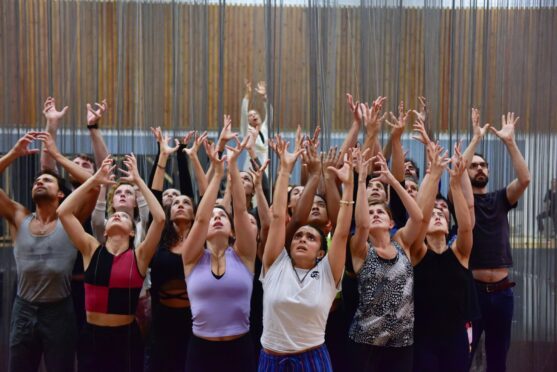
Olivier Award-winning choreographer and director Deborah Colker is no stranger to challenges.
After all, she guided thousands of volunteers for the opening ceremony of the 2016 Olympics in Rio and has staged groundbreaking dance shows around the world. She admits directing the first opera of her career is just as big a challenge.
She is working with Scottish Opera on Ainadamar, the Scottish premiere and first fully-staged UK production of Osvaldo Golijov’s opera.
Explaining the challenge, Colker’s passion and commitment to her art shone through. “In the Olympics, I worked with 5,000 people and was representing my home city, Rio de Janeiro. We didn’t have lots of money and it was after London, so we needed to keep the level. You have no idea how much I worked at the Olympics – I almost died! I didn’t have one free day, but we did it. It was a big challenge, and here with Ainadamar I think it is another big challenge.”
The winner of the Olivier Award for outstanding achievement in dance in 2001 for Mix, which investigated the physics of motion on a vertical stage, Colker has brought her dance company, Companhia de Danca Deborah Colker, to the UK on several occasions, including the Edinburgh Festival. She also wrote, directed and choreographed the Cirque du Soleil production, Ovo, which helped to showcase her talents to a new audience. It is likely Ainadamar will do similar.
“I had always thought about opera, because I began my life inside music,” she explained. “I studied piano and my father used to be a violinist and conductor. I danced when I was young, stopped when I was studying music and playing volleyball, then came back to dance at 16. My mum said it wasn’t a profession and demanded I do a university degree – I did psychology – but music has always been a part of my life and many times I thought it would be great to direct an opera.
“When Scottish Opera invited me, I thought, ‘Wow, I didn’t expect it would be at this moment and that it would be out of my country’. It’s not easy for me with my language, but I thought I would take the challenge and learn from it. I can open a new window in my life with this.
“It’s nice to be here and it’s inspiring. It’s my first time with singers and I’m loving the experience.”
Co-presented with Opera Ventures, Ainadamar is by Argentinian composer Golijov and acclaimed American librettist David Henry Hwang, and explores the life and work of playwright and poet Federico Garcia Lorca, whose anti-fascist stance and open homosexuality led to his death in 1936 at the hands of Franco’s Nationalists during the Spanish Civil War. It combines opera with flamenco dance and song, and sees celebrated mezzo-soprano Samantha Hankey play Lorca, while his muse Margarita Xirgu is sung by Lauren Fagan.
“We are inside the Spanish world. It’s intense and passionate. Ainadamar is about lust, death, memory, love and poetry. The relevance of Lorca’s poetry is impressive. He lingers through the centuries – born in the 19th, dying in the 20th and influencing us in the 21st.”
Colker is learning to adapt to a different way of working.
“We have seven weeks to put everything together,” she added. “They laugh here at Scottish Opera and say this isn’t common; it’s usually only six weeks. But with my company it’s usually two or three years, from the creation process to testing and trying and improving and experimenting. I’m not the kind of director who comes with everything ready. I like to feel. This demands time, so it’s a big challenge to change and adapt the way I create.
“I’m trying to be me, to be Deborah. The way I like to work, my passion, my culture, my intensity. This is a challenge.”
Ainadamar – October 29, November 2, 5, Theatre Royal, Glasgow; November 8, 10, 12, Festival Theatre, Edinburgh

Enjoy the convenience of having The Sunday Post delivered as a digital ePaper straight to your smartphone, tablet or computer.
Subscribe for only £5.49 a month and enjoy all the benefits of the printed paper as a digital replica.
Subscribe